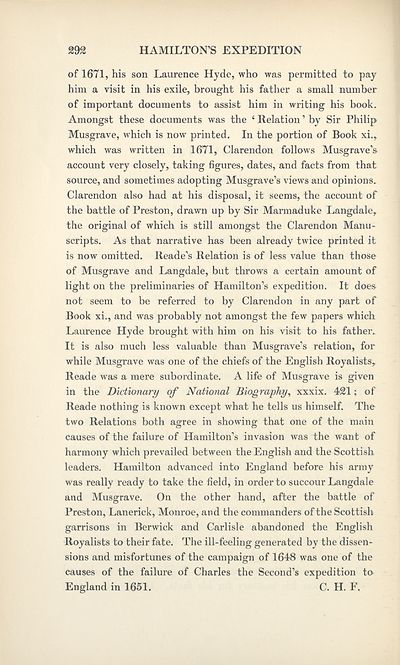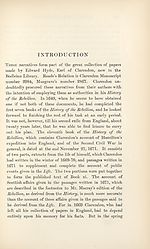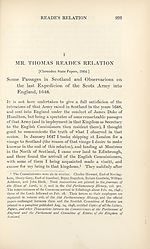Series 1 > Miscellany of the Scottish History Society (Second volume)
(317) Page 292
Download files
Complete book:
Individual page:
Thumbnail gallery: Grid view | List view

292
HAMILTON’S EXPEDITION
of 1671, his son Laurence Hyde, who was permitted to pay
him a visit in his exile, brought his father a small number
of important documents to assist him in writing his book.
Amongst these documents was the ‘ Relation1 by Sir Philip
Musgrave, which is now printed. In the portion of Book xi.,
which was written in 1671, Clarendon follows Musgrave’s
account very closely, taking figures, dates, and facts from that
source, and sometimes adopting Musgrave’s views and opinions.
Clarendon also had at his disposal, it seems, the account of
the battle of Preston, drawn up by Sir Marmaduke Langdale,
the original of which is still amongst the Clarendon Manu¬
scripts. As that narrative has been already twice printed it
is now omitted. Reade’s Relation is of less value than those
of Musgrave and Langdale, but throws a certain amount of
light on the preliminaries of Hamilton’s expedition. It does
not seem to be referred to by Clarendon in any part of
Book xi., and was probably not amongst the few papers which
Laurence Hyde brought with him on his visit to his father.
It is also much less valuable than Musgrave’s relation, for
while Musgrave was one of the chiefs of the English Royalists,
Reade was a mere subordinate. A life of Musgrave is given
in the Dictionary of National Biography, xxxix. 421; of
Reade nothing is known except what he tells us himself. The
two Relations both agree in showing that one of the main
causes of the failure of Hamilton’s invasion was the want of
harmony which prevailed between the English and the Scottish
leaders. Hamilton advanced into England before his army
was really ready to take the field, in order to succour Langdale
and Musgrave. On the other hand, after the battle of
Preston, Lanerick, Monroe, and the commanders of the Scottish
garrisons in Berwick and Carlisle abandoned the English
Royalists to their fate. The ill-feeling generated by the dissen¬
sions and misfortunes of the campaign of 1648 was one of the
causes of the failure of Charles the Second’s expedition ta
England in 1651. C. H. F.
HAMILTON’S EXPEDITION
of 1671, his son Laurence Hyde, who was permitted to pay
him a visit in his exile, brought his father a small number
of important documents to assist him in writing his book.
Amongst these documents was the ‘ Relation1 by Sir Philip
Musgrave, which is now printed. In the portion of Book xi.,
which was written in 1671, Clarendon follows Musgrave’s
account very closely, taking figures, dates, and facts from that
source, and sometimes adopting Musgrave’s views and opinions.
Clarendon also had at his disposal, it seems, the account of
the battle of Preston, drawn up by Sir Marmaduke Langdale,
the original of which is still amongst the Clarendon Manu¬
scripts. As that narrative has been already twice printed it
is now omitted. Reade’s Relation is of less value than those
of Musgrave and Langdale, but throws a certain amount of
light on the preliminaries of Hamilton’s expedition. It does
not seem to be referred to by Clarendon in any part of
Book xi., and was probably not amongst the few papers which
Laurence Hyde brought with him on his visit to his father.
It is also much less valuable than Musgrave’s relation, for
while Musgrave was one of the chiefs of the English Royalists,
Reade was a mere subordinate. A life of Musgrave is given
in the Dictionary of National Biography, xxxix. 421; of
Reade nothing is known except what he tells us himself. The
two Relations both agree in showing that one of the main
causes of the failure of Hamilton’s invasion was the want of
harmony which prevailed between the English and the Scottish
leaders. Hamilton advanced into England before his army
was really ready to take the field, in order to succour Langdale
and Musgrave. On the other hand, after the battle of
Preston, Lanerick, Monroe, and the commanders of the Scottish
garrisons in Berwick and Carlisle abandoned the English
Royalists to their fate. The ill-feeling generated by the dissen¬
sions and misfortunes of the campaign of 1648 was one of the
causes of the failure of Charles the Second’s expedition ta
England in 1651. C. H. F.
Set display mode to:
![]() Universal Viewer |
Universal Viewer | ![]() Mirador |
Large image | Transcription
Mirador |
Large image | Transcription
Images and transcriptions on this page, including medium image downloads, may be used under the Creative Commons Attribution 4.0 International Licence unless otherwise stated. ![]()
| Scottish History Society volumes > Series 1 > Miscellany of the Scottish History Society (Second volume) > (317) Page 292 |
|---|
| Permanent URL | https://digital.nls.uk/126950792 |
|---|
| Attribution and copyright: |
|
|---|
| Description | Over 180 volumes, published by the Scottish History Society, containing original sources on Scotland's history and people. With a wide range of subjects, the books collectively cover all periods from the 12th to 20th centuries, and reflect changing trends in Scottish history. Sources are accompanied by scholarly interpretation, references and bibliographies. Volumes are usually published annually, and more digitised volumes will be added as they become available. |
|---|


